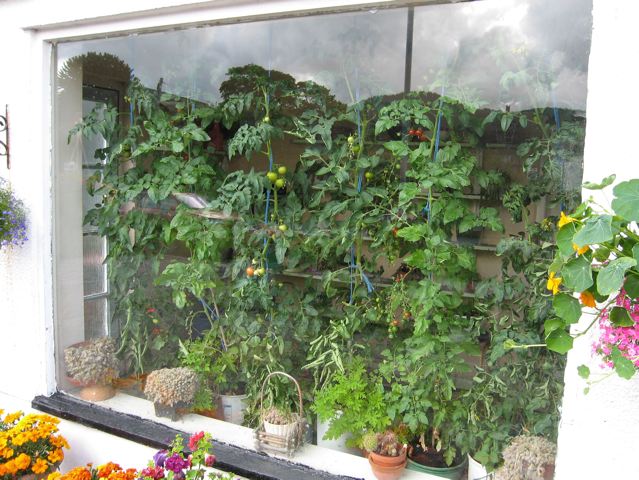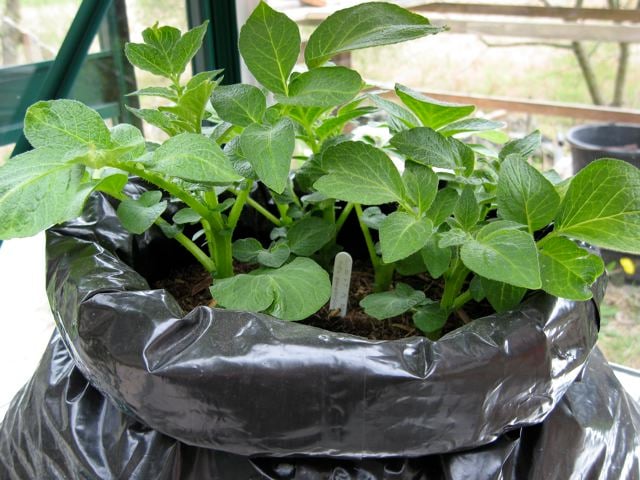Make do and mend, learn to do without, pull your socks up and get stuck in: it’s time to cultivate some old-fashioned values in the garden.
Have you noticed how austerity is getting a drubbing lately? Barely a newsflash whizzes by without mention of an ‘austerity programme’ being launched here, an ‘austerity measure’ being implemented there, or the devising of yet another ‘prescription for austerity’. Most of this austerity chatter is taking place against the backdrop of a stuttering global economy that’s no longer fit for purpose, blended with unprecedented political upheaval.
Austerity – which in this context means hardship (for some, not all) caused by spending cuts, wage freezes and rising unemployment – is constantly plugged as unavoidable, but is, with growing hostility, viewed as not the only game in town. But that’s just the human, doom- and gloom-laden take on austerity. Out in my fast-warming greenhouse, and in my garden, beyond the reach of the fickleness of money and politics, austerity is doing very nicely, thank you.

I guess my garden austerity programme really kicked in when I took the decision, some years ago, to stop heating my greenhouse in spring (or indeed at any other time). Much as I’d enjoyed many years of lifting the temperature a few degrees in late winter and early spring, to mollycoddle premature seedlings that were too early for their own good, a growing sense of the finiteness of things, especially ‘fossil fuels’, gradually took root and won me over. Although my senses still soar with sentimentality when I catch the whiff of a paraffin heater, in the end I couldn’t square using a finite source of energy derived from oil to pamper my plants. Such precious natural resources need to be reserved for far more pressing uses; there are other fuels to run gardens with.
Admittedly, I did wonder how this particular move would pan out: would it prove to be a road to horticultural hardship, or just a subtle shift in the way I did things? If ‘hardship’ is missing the experience of peering out at February sleet through misted-up bubble plastic, then yes, I guess it is, but in reality there’s been nothing tough about it. That kick-start to my garden’s austerity programme is working out just fine and, to boot, our environment is reaping the benefits. My greenhouse crops, nurtured using only renewable ‘modern’ sunshine (as opposed to the ‘ancient’ sunshine stored in fossil fuels), come with barely a carbon toeprint, let alone the hefty footprint planted by so many of our gardening activities.
This undercover austerity measure means I start picking my first tomatoes a few weeks later than I used to, but it saves me money, it doesn’t add carbon dioxide to the atmosphere, and the renewed connectedness I have with the changing seasons – topsy-turvy as they’re becoming – gives me a real buzz. On the heels of that buzz comes the constant lure of a challenge: just what crops can I grow without heating my greenhouse at all, to make it earn its keep and feed me some fresh grub every week of the year? I’d have none of this growing adventure if I still relied on maintaining my own artificially heated little world year-round, using fossil energy (which includes gas and electricity, unless the latter’s from a renewable source, such as solar photovoltaic panels or a wind turbine). This is one hardship that’s made my gardening more challenging, but also more fun. Austerity? Bring it on.
My self-imposed prescription for austerity is also paying dividends elsewhere in my garden; it does involve some temporary spells of hardship, but this is more akin to simple hard work. If, like me, you eschew the use of synthetic pesticides, fungicides and weedkillers and follow a more earth-friendly, organic approach to gardening, there will be times when the going gets tough. It doesn’t get much tougher than when preparing a new area of garden or an overgrown allotment that’s being won back by wild plants (aka pernicious perennial weeds).
But if breaking a sweat, cussing some intractable taproot and, later, soaking your aching muscles in the bath is hardship, so be it. Once again, the natural world reaps the benefits. By avoiding the without-a-second-thought use of ubiquitous weedkillers such as glyphosate (which has a cloud of question marks gathering over it), we not only reduce demand for the oil and energy needed to make, package, ship and sell them, we avoid the risk of them contaminating our shared and life-maintaining natural assets: air, soil and water. It might be an austere move – preferring muscle power to quick chemical fixes – but if it helps keep my garden more in tune with the limits of the natural world, there are some gardening luxuries I’ll happily forgo.

Although austerity might, through the human lens, be synonymous with misery, in my garden it plays out happily alongside its cousins thrift, frugality and prudence – the underpinning tenets of greener, more earth-friendly gardening. Using less resources, finding ways of working with nature to avoid weed, pest and disease problems, and creating more resilient gardens that reduce demand for non-renewable energy, are all simple, unadorned and often money-saving ways of doing more with less. The future is going to be all about finding creative and innovative ways of getting by with less resources, and what better place for a practice run than out on your plot?
But self-restraint isn’t something you’ll see or hear very much about in gardening magazines or programmes; the unwavering message is that we need more and more, that we must keep on buying. Modern gardening isn’t about cutting back and having an eye to the future, it’s about non-stop 24/7 consumption driven by fads and gimmicks amid a bombardment of advertising via TV, letterbox and inbox. Making big bucks constantly trumps bigger thinking.
My own austerity programme is doing just fine. As well as making gardening altogether more interesting, it’s also encouraging me to make connections between what I do in my garden and the wider natural world. Like many others, I’m feeling the hard bite of social shake-up, but out in my greenhouse and garden I’m finding that austerity is working hard to keep my gardening as earth-friendly as it can be. It looks to me like the only – and the greenest – game in town.
Text and images © John Walker










